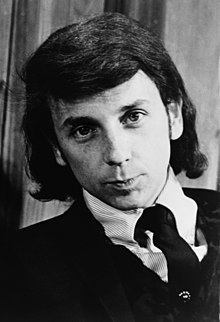
Back Phil Spector Afrikaans فيل سبيكتور Arabic فيل سبيكتور ARZ فیل اسپکتور AZB Філ Спектар Byelorussian Фил Спектър Bulgarian Phil Spector Catalan Phil Spector Czech Phil Spector Welsh Phil Spector Danish
Phil Spector | |
|---|---|
 Spector in 1965 | |
| Background information | |
| Birth name | Harvey Philip Spector[1] |
| Also known as | Harvey Phillip Spector |
| Born | December 26, 1939 New York City, U.S. |
| Origin | Los Angeles, California, U.S. |
| Died | January 16, 2021 (aged 81) French Camp, California, U.S. |
| Genres | |
| Occupation(s) |
|
| Years active | 1958–2009 |
| Labels | |
| Formerly of |
|
| Spouse(s) | Annette Merar
(m. 1963; div. 1966)Rachelle Short
(m. 2006; div. 2018) |
| Website | philspector |
Harvey Phillip Spector (December 26, 1939 – January 16, 2021) was an American record producer and songwriter best known for his innovative recording practices and entrepreneurship in the 1960s and his two trials and conviction for murder in the 2000s. Spector developed the Wall of Sound, a production style that is characterized for its diffusion of tone colors and dense orchestral sound, which he described as a "Wagnerian" approach to rock and roll. He is widely regarded as one of the most influential figures in pop music history[2][3] and one of the most successful producers of the 1960s.[4]
Born in the Bronx, Spector moved to Los Angeles as a teenager and began his career in 1958, as a founding member of The Teddy Bears, for whom he penned, "To Know Him Is to Love Him", a U.S. number-one hit. In 1960, after working as an apprentice to Jerry Leiber and Mike Stoller, Spector co-founded Philles Records, and at the age of 21, he became the youngest-ever U.S. label owner at the time.[5] Dubbed the "First Tycoon of Teen",[6][7] Spector came to be considered the first auteur of the music industry, for the unprecedented control he had over every phase of the recording process.[8] He produced acts such as The Ronettes, The Crystals, and Ike & Tina Turner, and typically collaborated with arranger Jack Nitzsche and engineer Larry Levine. The musicians from his de facto house band, later known as "The Wrecking Crew", rose to industry fame through his hit records.
In the early 1970s, Spector produced the Beatles' Let It Be and several solo records by John Lennon and George Harrison. By the mid-1970s, Spector had produced eighteen U.S. Top 10 singles, for various artists. His chart-toppers included the Righteous Brothers' "You've Lost That Lovin' Feelin'", the Beatles' "The Long and Winding Road", and Harrison's "My Sweet Lord". Spector helped establish the role of the studio as an instrument,[9] the integration of pop art aesthetics into music (art pop),[10] and the genres of art rock[11] and dream pop.[12] His honors include the 1973 Grammy Award for Album of the Year, for co-producing Harrison's Concert for Bangladesh, a 1989 induction into the Rock and Roll Hall of Fame, and a 1997 induction into the Songwriters Hall of Fame.[13] In 2004, Spector was ranked number 63 on Rolling Stone's list of the greatest artists in history.[14]
Following one-off productions for Leonard Cohen (Death of a Ladies' Man), Dion DiMucci (Born to Be with You), and the Ramones (End of the Century), from the 1980s on, Spector remained largely inactive, amid a lifestyle of seclusion, drug use, and increasingly erratic behavior.[15] In 2009, after two decades in semi-retirement,[16] he was convicted of the 2003 murder of actress Lana Clarkson and sentenced to 19 years to life in prison, where he died, in 2021.
- ^ Grimes, William (January 17, 2021). "Phil Spector, Famed Music Producer and Convicted Murderer, Dies at 81". The New York Times.
- ^ Cite error: The named reference
Wood21was invoked but never defined (see the help page). - ^ Spillius, Alex (April 13, 2009). "Phil Spector guilty of murdering actress Lana Clarkson". The Daily Telegraph. Archived from the original on February 11, 2018. Retrieved April 2, 2018.
- ^ Brown 2007, p. 1.
- ^ Brown, Mick (February 4, 2003). "Pop's lost genius". The Daily Telegraph. Archived from the original on September 10, 2018. Retrieved September 10, 2018.
- ^ Williams 2003, p. 5.
- ^ Wolfe, Tom (January 3, 1965). "First Tycoon of Teen". New York Magazine, published as a supplement to the New York Herald Tribune. (This appears in the microfilm edition of the Herald Tribune but apparently not in the online database)
- ^ Williams 2003, p. 23.
- ^ Bannister 2007, p. 38.
- ^ Holden, Stephen (February 28, 1999). "Music; They're Recording, but Are They Artists?". The New York Times. Archived from the original on November 30, 2016. Retrieved July 17, 2013.
- ^ Williams 2003, p. 25.
- ^ Wiseman-Trowse, Nathan (September 30, 2008). Performing Class in British Popular Music. Springer. pp. 148–154. ISBN 978-0-230-59497-5.
- ^ "Phil Spector". Songwriters Hall of Fame. Retrieved January 19, 2021.
- ^ See:
- "100 Greatest Artists of All Time". Rolling Stone. Archived from the original on August 19, 2011. Retrieved June 30, 2010.
- "The Immortals: Phil Spector". Rolling Stone. No. 946. Archived from the original on May 18, 2009. Retrieved September 8, 2017.
- ^ Sevigny, Catherine (May 5, 2007). "Wall of silence". The Guardian. Archived from the original on January 24, 2019. Retrieved January 24, 2019.
- ^ Unterberger, Richie. "Phil Spector". AllMusic. Archived from the original on May 2, 2020. Retrieved April 21, 2020.
© MMXXIII Rich X Search. We shall prevail. All rights reserved. Rich X Search